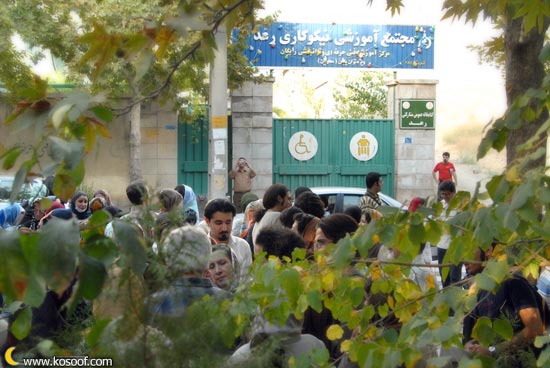Iranian women continue their struggle for equal rights beyond all governmental obstacles. A few days ago, a group of tireless Iranian women activists launched another campaign against discrimination entitled “One Million Signatures Demanding Changes to Discriminatory Laws [1].”
This demonstration was backed by personalities such as Nasser Zaarafshan [2], writer and human right activist, Nobel Peace Prize Laureate Shirin Ebadi [3] and several others. Iranian men were also present to support the women's campaign, which was aimed at abolishing discriminatory laws in Iran. Activist women wanted to launch their first day campaign by organizing a seminar at a charity Institute, but government refused them permission and left them behind closed doors. Several Iranian bloggers, both male and female, were present at this gathering and shared their thoughts, photos and feelings.

Arash Ashourinia, a leading photoblogger and journalist, showed us what happened through his photos [4] and words. His blog, Kosoof, features several photos of this gathering, in the street behind closed doors.
Ashourinia says that authorities did not let women came together at the Rad charity Institute. The blogger adds that Iranian women’s rights activists are initiating a wide-ranging campaign demanding an end to legal discrimination against women in Iranian law [4]:
Campaign, “One Million Signatures Demanding Changes to Discriminatory Laws,” which aims to collect one million signatures to demand changes to discriminatory laws against women, is a follow-up effort to the peaceful protest with the same aim which took place on June 12, 2006 in Haft-e Tir Square in Tehran. Preparation activities in support of this campaign commenced 0n June of 2006 and the campaign will be officially launched on August 27, during a seminar entitled: “The Impact of Laws on Women’s Lives.”
But the authorities did not let them to hold their seminar and claimed that they should get permission from the ministry. According to the current law of Iran, holding seminars & peaceful demonstrations do not require legal permission.
It seems that the lack of a venue for this gathering did not discourage participants, who, according to the blogger, mingled in the street and some of the speakers had chatted with the people present.
Blogger Soheil Asefi adds:
Asefi also noted the presence of personalities such as Shirin Ebadi and said the act of closing the doors to participants was illegal [5] [Fa].
Aroosak Kooki said, with some irony, that in Iran it would soon require legal permission just to breathe air [6] [Fa]. Aroosak Kooki noted that because of threats the Institute had closed its doors to the activists, who were nevertheless willing to take signatures and register volunteers. Aroosak Kooki took this as a sign of the activists’ determination to continue and refusal to become discouraged.
Sooratak says that 200 men and women had already signed the campaign and that they would continue until they had gathered the one million signatures and until the discriminatory laws were changed [7] [Fa].
Tadai azad writes that a good thing had happened for her that day, and that she had seen that, to be a good citizen in Iran, you needed to become blind [8] [Fa]. Iran, writes Tadai, is a country where all doors are closed to you the moment you speak the truth.
Harfayi Baraye Nagoftan cites a statement by Nasser Zarafshan, who said that this movement and these ideas should move from up (intellectuals) to down (ordinary people), and that if this movement did not find its way into masses it would stagnate and become ineffective [9] [Fa].